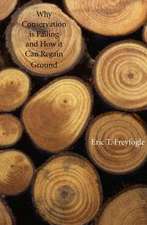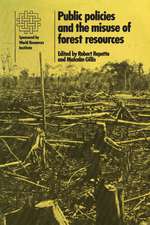Punctuated Equilibrium and the Dynamics of U.S. Environmental Policy
Editat de Robert Repetto Cuvânt înainte de James Gustave Spethen Limba Engleză Paperback – 19 mai 2006
Although many environmental policy issues remain deadlocked for decades with little movement, sometimes breakthroughs occur abruptly. Why do deadlocks persist? Why do major policy shifts occur infrequently? Is it possible to judge when policies are ripe for change?
This book presents new empirical evidence that the punctuated equilibrium theory of policy dynamics fits the facts of environmental policy change and can explain how stable policies can suddenly unravel in discontinuous change. The distinguished contributors to the volume apply the theory to a wide range of important environmental and resource issues and assess case histories in water, forestry, fisheries, public lands, energy and climate some of which resulted in breakthroughs, others in stalemate. They offer insights into the political conditions and tactics that are likely to produce these disparate outcomes. Every professional, activist, and student concerned with promoting (or resisting) change in environmental and natural resources policies will find this up-to-date book an invaluable guide.
Preț: 379.45 lei
Nou
Puncte Express: 569
Preț estimativ în valută:
72.62€ • 75.53$ • 59.95£
72.62€ • 75.53$ • 59.95£
Carte tipărită la comandă
Livrare economică 15-29 aprilie
Preluare comenzi: 021 569.72.76
Specificații
ISBN-13: 9780300110760
ISBN-10: 0300110766
Pagini: 304
Ilustrații: 13 b-w illus.
Dimensiuni: 156 x 235 x 16 mm
Greutate: 0.47 kg
Ediția:First Edition
Editura: Yale University Press
Colecția Yale University Press
ISBN-10: 0300110766
Pagini: 304
Ilustrații: 13 b-w illus.
Dimensiuni: 156 x 235 x 16 mm
Greutate: 0.47 kg
Ediția:First Edition
Editura: Yale University Press
Colecția Yale University Press
Recenzii
"A first-rate volume with specific and well-presented case studies."—Bryan D. Jones, University of Washington
"As someone who strives consistently to improve environmental policies, I know how hard that can sometimes be to accomplish. Those of us who care about conservation, whatever our political affiliations, can learn a great deal from this book about the factors that lead to success."—Congressman Mark Udall (D-CO)
“Robert Repetto and his colleagues have produced a volume that should have an important effect on how we view the development of environmental policy and how we nurture that process.”—James Gustave Speth, from the Foreword
"For a generation, environmental problem solving has been overtaken by political deadlock, even as environmental pressures continue to mount. This book argues for a fresh perspective on the unavoidable challenges faced by our species (and all others)."—Kai N. Lee, Williams College
"The use of case studies to apply the punctuated equilibrium approach is novel and important. An excellent collection."—Scott Robinson, University of Texas at Dallas
"As someone who strives consistently to improve environmental policies, I know how hard that can sometimes be to accomplish. Those of us who care about conservation, whatever our political affiliations, can learn a great deal from this book about the factors that lead to success."—Congressman Mark Udall (D-CO)
“Robert Repetto and his colleagues have produced a volume that should have an important effect on how we view the development of environmental policy and how we nurture that process.”—James Gustave Speth, from the Foreword
"For a generation, environmental problem solving has been overtaken by political deadlock, even as environmental pressures continue to mount. This book argues for a fresh perspective on the unavoidable challenges faced by our species (and all others)."—Kai N. Lee, Williams College
"The use of case studies to apply the punctuated equilibrium approach is novel and important. An excellent collection."—Scott Robinson, University of Texas at Dallas
"A first-rate volume with specific and well-presented case studies."—Bryan D. Jones, University of Washington
"As someone who strives consistently to improve environmental policies, I know how hard that can sometimes be to accomplish. Those of us who care about conservation, whatever our political affiliations, can learn a great deal from this book about the factors that lead to success."—Congressman Mark Udall (D-CO)
"A must read for those seeking policy change for the global environmental challenges of today, including climate change.
The fascinating case studies show key tipping points, what has worked and what has not."—Frances Beinecke, President, Natural Resources Defense Council
The fascinating case studies show key tipping points, what has worked and what has not."—Frances Beinecke, President, Natural Resources Defense Council
"For a generation, environmental problem solving has been overtaken by political deadlock, even as environmental pressures continue to mount. This book argues for a fresh perspective on the unavoidable challenges faced by our species (and all others)."—Kai N. Lee, Williams College
"The use of case studies to apply the punctuated equilibrium approach is novel and important. An excellent collection."—Scott Robinson, University of Texas at Dallas
Notă biografică
Robert Repetto is professor in the Practice of Sustainable Development, Yale School of Forestry and Environmental Studies.












